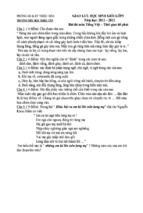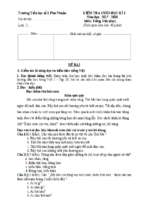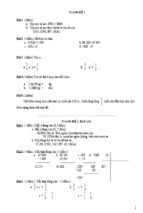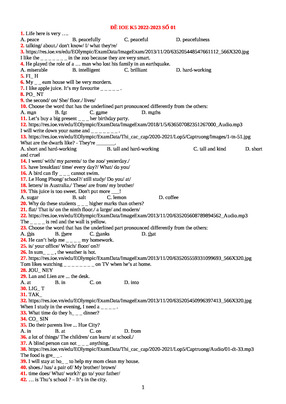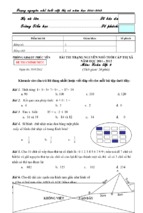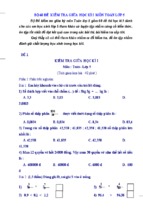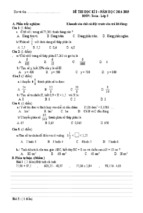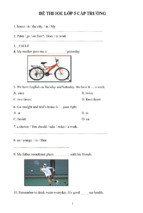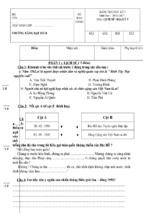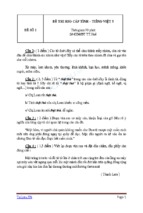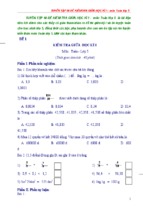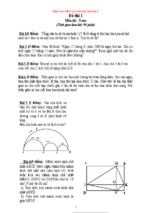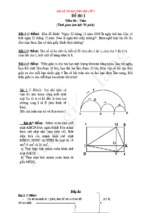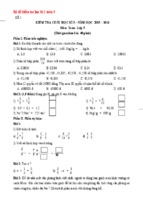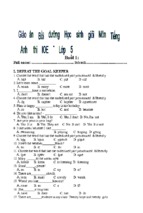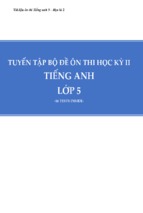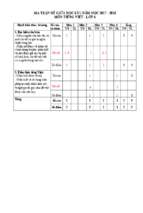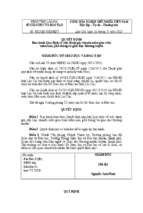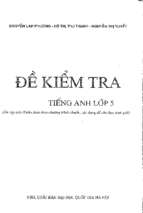Unit 7. FURTHER EDUCATION
PART 1: VOCABULARY AND GRAMMAR REVIEW
A. VOCABULARY
abroad
/əˈbrɔːd/
academic
/ˌækəˈdemɪk/
học
(adv) ở nước ngoài
(adj) thuộc về hoặc liên quan đến giáo dục, việc học tập, mang tính
accommodation /əˌkɒməˈdeɪʃn/
achieve
/əˈtʃiːv/
admission
/ədˈmɪʃn/
analytical
/ˌænəˈlɪtɪkl/
baccalaureate /ˌbækəˈlɔːriət/
bachelor
/ˈbætʃələ(r)/
broaden
/ˈbrɔːdn/
campus
/ˈkæmpəs/
collaboration /kəˌlæbəˈreɪʃn/
college
/ˈkɒlɪdʒ/
consult
/kənˈsʌlt/
coordinator /kəʊˈɔːdɪneɪtə(r)/
course
/kɔːs/
critical
/ˈkrɪtɪkl/
CV
/ˌsiːˈviː/
(n)
(v)
(n)
(adj)
(n)
(n)
(n)
(n)
(n)
(n)
(v)
(n)
(n)
(adj)
(n)
dean
degree
diploma
doctorate
eligible
enrol
enter
faculty
institution
internship
kindergarten
major
mandatory
Master
passion
potential
profession
pursue
qualification
scholarship
skill
talent
training
transcript
(n)
(n)
(n)
(n)
(adj)
(v)
(v)
(n)
(n)
(n)
(n)
(n)
(a)
(n)
(n)
(n)
(n)
(v)
(n)
(n)
(n)
(n)
(n)
(n)
/diːn/
/dɪˈɡriː/
/dɪˈpləʊmə/
/ˈdɒktərət/
/ˈelɪdʒəbl/
/ɪnˈrəʊl/
/ˈentə(r)/
/ˈfæklti/
/ˌɪnstɪˈtjuːʃn/
/ˈɪntɜːnʃɪp/
/ˈkɪndəɡɑːtn/
/ˈmeɪdʒə(r)/
/ˈmændətəri/
/ˈmɑːstə(r)/
/ˈpæʃn/
/pəˈtenʃl/
/prəˈfeʃn/
/pəˈsjuː/
/ˌkwɒlɪfɪˈkeɪʃn/
/ˈskɒləʃɪp/
/skɪl/
/ˈtælənt/
/ˈtreɪnɪŋ/
/ˈtrænskrɪpt/
thuật
tiện nghi ăn ở, chỗ ăn ở
đạt được
sự vào hoặc được nhận vào một trường học
(thuộc) phân tích
kì thi tú tài
người có bằng cử nhân
mở rộng, nới rộng
khu trường sở, sân bãi (của các trường trung học, đại học)
cộng tác
trường cao đẳng hoặc trường chuyên nghiệp
hỏi ý kiến, tra cứu, tham khảo
người điều phối, điều phối viên
khóa học, chương trình học
thuộc bình phẩm, phê bình
viết tắt của curriculum vitae, bản tóm tắt quá trình hoạt động của
một người (thường nộp theo đơn xin việc); bản lí lịch
chủ nhiệm khoa (một trường đại học)
học vị, bằng cấp
bằng cấp, văn bằng
học vị tiến sĩ
đủ tư cách, thích hợp
ghi danh
gia nhập, theo học một trường
khoa (của một trường đại học)
viện, trường đại học
giai đoạn thực tập
trường mẫu giáo ( cho trẻ 4 - 6 tuổi)
môn học chính của sinh viên, chuyên ngành
có tính bắt buộc
thạc sĩ
sự say mê, niềm say mê
khả năng, tiềm lực
nghề, nghề nghiệp
đeo đuổi
văn bằng, học vị, chứng chỉ
học bổng
kĩ năng
tài năng, năng lực, nhân tài
rèn luyện, đào tạo
học bạ, phiếu điểm
B. GRAMMAR REVIEW
1. PRESENT PERFECT (Hiện tại hoàn thành)
a. Form (Cấu trúc):
(+) S + have/ has + Pii + O
(-) S + have/ has + not + Pii + O
(?) Have/ has (not) + S + Pii + O?
b. Uses (Cách sử dụng)
- Diễn tả 1 sự việc vừa mới xảy ra.
Ex: I have just finished the financial report. (Tôi vừa hoàn thành xong bản báo cáo tài chính.)
- Diễn tả 1 sự việc đã xảy ra trong quá khứ nhưng còn liên quan đến hiện tại.
Ex: My husband has worked for this company for 2 years. (Chồng tôi đã làm cho công ty này được 2
năm - Nghĩa là: cách đây 2 năm đã bắt đầu làm, hiện tại vẫn có thể đang làm cho công ty này hoặc
không)
- Diễn tả 1 sự việc đã xảy ra ở một thời điểm không xác định trong quá khứ.
Ex: She has been in China for a long time. (Đã có một thời gian dài cô ấy ở Trung Quốc.)
- Nhấn mạnh đến trải nghiệm bản thân (the first/second/third/last… time), nhấn mạnh kết quả:
Ex:
+ I have seen that film three times. (Tôi đã từng xem bộ phim này 3 lần)
+ This is the first time that he has been in the USA. (Đây là lần đầu tiên anh ấy đến Mỹ)
c. Advs (Trạng ngữ nhận biết)
- just, v ừa m ới
-recently, lately: gần đây, vừa mới
- before : trước đây
- already: rồi
- ever: từng
- never: không bao giờ, chưa bao giờ
- yet: chưa
- since: kể từ khi
- for: khoảng
- so far = until now = up to now = up to the present: cho đến bây giờ
d. Một số lưu ý đối với thì hiện tại hoàn thành
- Phân biệt “Since” và “For”:
since
+
mốc thời gian
for
+
khoảng thời gian
Ex:
- I've known Anna since October.
- I've known Anna for two months.
- Phân biệt “yet” và “already”:
yet
: dùng trong câu phủ định và câu nghi vấn
already
: dùng trong câu khẳng định
Ex:
- He hasn't come yet.
- I've already posted the letters.
- Thường dùng “ever”, “never” với Hiện tại hoàn thành:
Ex:
- He has never been there.
- Have you ever eaten snake meat?
- Phân biệt “Have/ has been” khác với “have/ has gone”:
Ex:
(a) Mr. Smith is not here at the moment. He has gone to a meeting in London.
(b) Amada has been to the travel agent. She has your tickets for Hong Kong.
Trong 2 ví dụ trên, ví dụ (a) có thể hiểu là Mr. Smith vẫn đang ở buổi họp trong khi đó ở ví dụ (b)
Amada đã đi đến đó và trở về rồi.
- Một số lưu ý khác:
Trong các mệnh để diễn tả sự so sánh hơn nhất, số thứ tự, sự duy nhất hay số lần thực hiện
hành động
→ Động từ chia ở Hiện tại hoàn thành.
Ex:
- This is the most interesting story I have heard.
- This is the only foreigner I have ever known.
(1) It's the first / second / ... time + HTHT
(2) This is the first / second ... time + HTHT
Ex:
- It's the first time I have driven a car.
- This is the first time she has lived in New York.
Its + khoảng thời gian + since + sb last did sth: Đó là khoảng thời gian kể từ khi ai
đó làm gì.
Ex:
I haven't seen her for 3 days. → It's 3 days since I last saw her.
2. PRESENT PERFECT CONTINUOUS (Hiện tại hoàn thành tiếp diễn)
a. Form (Cấu trúc)
(+) S + have/ has + been + Ving
(-) S + have/ has + not + been + Ving
(?) Have/ Has (not) + S + been + Ving?
b. Uses (Cách sử dụng): Diễn tả sự việc đã xảy ra trong quá khứ, kéo dài đến hiện tại và có thể tiếp tục xảy ra
trong tương lai. (Nhấn mạnh tính liên tục của hành động)
Ex:
I have been teaching English since I was a second-year student.
(Tôi đã dạy tiếng Anh kể từ khi tôi là sinh viên năm thứ 2, đã bắt đầu dạy trong quá khứ, hiện tại vẫn
đang tiếp tục dạy và có thể trong tương lai vẫn dạy)
c. Advs (Trạng ngữ nhận biết)
- For + time + now, và giống các trạng ngữ của thì hiện tại hoàn thành (Thường sẽ có 1 vế giải thích ở hiện tại
tiếp diễn)
PART 2: EXERCISES
A. PHONETICS
I. Find the word which has a different sound in the part underlined.
1. A. ago
B. across
C. about
D. adult
2. A. language
B. article
C. partly
D. hardly
3. A. but
B. cut
C. sun
D. put
4. A. lake
B. plane
C. plan
D. state
5. A. lecture
B. medium
C. inventor
D. president
II. Choose the word which has a different stress pattern from the others.
1. A. definition
B. politician
C. situation
D. production
2. A. image
B. purchase
C. mislead
D. deadline
3. A. extinction
B. endangered
C. business
D. intention
4. A. cattle
B. country
C. canal
D. cover
5. A. copy
B. remove
C. notice
D. cancel
B. VOCABUALRY AND GRAMMAR
I. Put the verbs in the present perfect or the present perfect continuous tense.
1. I (try) ___have been trying___ to learn French for years, but I (not succeed) ___haven’t succeeded__ yet.
2. She (read) ___has been reading___ all the works of Dickens. How many (you read) ___have you
read___?
3. I (wait) ___have been waiting___ here nearly half an hour for my girlfriend; do you think she (forget)
___has forgot____ to come?
4. Mary (rest) ___has rested__ in the garden all day because she (be) _____was____ ill.
5. Although John (study) ____has been studying___ at the University for 5 years, he (not get) __hasn’t
got___ his degree yet.
6. Jack (go) ____has gone___ to Switzerland for a holiday. He (never, be) ___has never been____ there.
7. We (live) ____have lived__ here for the last six months, and (just, decide) __have just decided___ to
move.
8. That book (lie) ____has been lying____ on the table for weeks. You (not read) ___haven’t you read___
it yet?
9. He (not be) ____hasn’t been____ here since Christmas; I wonder where he (live) ___has lived___ since
then.
10. He (lose) ____has lost____ his books. He (look) ___has been looking___ for them all afternoon, but they
(not turn up) ___haven’t turned up___ yet.
11. She (work) ___has been working___ so hard this week that she (not have) ____hasn’t had___ time to go
to the cinema.
12. Your hair is wet. (You swim) ___Have you swum____ for a long time?
13. Bill is still a bad driver although he (drive) ____has been driving____ cars for six years.
14. You look very tired. (You work) ____Have you worked___ very hard ?
15. The phone (ring) ___has been ringing__ for 2 minutes, but I (not answer) ___haven’t answered__ it yet.
II. Put the correct preposition for the sentences below.
1. Academic courses should teach practical skills ______in_______ addition to critical thinking.
2. When a student enters a college or university, he/she has to choose a main subject ______of_____ study,
which is called major.
3. Specialized vocational courses such _______as______ design and cooking are very popular.
4. Students _______with________ bachelor's degrees can pursue postgraduate education to get master's or
doctoral degrees.
5. It's difficult ________to_______ find a place to park in the city centre.
6. Although Kevin did not have any academic qualifications, he had a lot _____of______ practical
experience.
7. We have just attended a seminar _______on____ further education.
8. Students can choose to pursue further education which is generally divided ______into_____ higher
education and vocational education and training.
9. I started the course two weeks ago, but I have already passed most _______of______ the tests.
10. The academic year has just started and I have been living _______in_____ the halls of residence so far.
III. Choose the correct words in brackets to complete the sentences.
1. Prof. Wilson has given / has been giving the same seminar to students for the last 12 years.
2. She has never understood / has never been understanding why so many young people want to study
abroad.
3. Nam has studied / has been studying English for two years.
4. He has attended / has been attending online vocational courses twice.
5. Have you applied / Have you applying for the scholarship to study in Singapore?
6. We have waited / have been waiting for the university's reply about entry requirements for the whole week.
We hope to receive it soon.
7. The British Council has used / has been using IELTS as an international standardised test of English for
non-native English language speakers for a long time.
8. The university has built / has been building a new campus since May.
9. We have read / have been reading three books on vocational training to complete this project.
10. They have read / have been reading a report on a further education since last Monday. I will finish it this
Sunday.
11. Mary has stayed / has been staying at a homestay for three weeks during her undergraduate programme.
12. I have applied / have been applying for a vocational scholarship three times.
IV. Use the word given in capitals at the end of each line to form the word that fits in the gap in the
same line.
1. Can you explain what types of _____funding___ are available for international students? (FUND)
2. Are _____international_____ students allowed to work part-time? (NATIONAL)
3. I'd like to consult you about the ______cultural_____ differences (that) I should be aware of. (CULTURE)
4. What _____worries______ me most is the high cost of living in London as an international student.
(WORRY)
5. One of the reasons for Vietnamese students' studying abroad is the quality of the _____academic_____
programmes in higher education. (ACADEMY)
6. Most of these students are interested in pursuing ______undergraduate_______ studies for bachelor's
degrees. (GRADUATE)
7. Some students decide to study in the United States or the United Kingdom to improve their language
_____skills______, which can help them to get a better job. SKILLFUL
8. Some universities in the United States offer different ____scholarships___ to international students to help
to cover tuition fees and living costs. (SCHOOL)
9. The higher education _____qualifications_____ gained at UK universities and colleges are recognised
worldwide. (QUALIFY)
10. Universities must better prepare students for their _____professional_____ careers. (PROFESSION)
V. Choose the best answer A, B, C or D to complete the sentences.
1. We ____ him since he ____ married.
A. didn't see/got
B. haven't seen/got C. don't/get
D. hadn't seen/got
2. I ____ the money yet.
A. not received
B. didn't receive
C. haven't received D. hadn't received
3. Today is Thursday and she ____ late twice this week. She ____ late yesterday and on Monday.
A. is/was
B. has been/is
C. has been/was
D. has been/had been
4. We ____ what to do with the money yet.
A. not decide
B. didn't decide
C. haven't decided
D. hadn't decided
5. My father ____ as a teacher for almost thirty years.
A. works
B. is working
C. worked
D. has been working
6. He ____ to New York at least three times this year.
A. had been going B. was going
C. has been going
D. is going
7. They ____ to know each other for more than ten years.
A. get
B. got
C. have got
D. had got
8. She ____ dishes already.
A. was washing
B. washed
C. has washed
D. has been washing
9. I ____ you for ages.
A. haven't been meeting
B. didn't meet
C. wasn't meeting
D. haven't met
10. Tom is still watching television. He ____ television all day.
A. has been watching
B. was watching
C. has watched
D. watched
11. A Bachelor's degree is a three-year or four-year course you take in undergraduate higher education after
you ____ further education.
A. has finished
B. had been finishing
C. have finished
D. have been finishing
12. At most institutions in the UK, the ____ starts in September or October and runs until June or July.
A. leap year
B. gap year
C. new year
D. academic year
13. That university ____ the Advanced Programme with the aim to enrol around 500 international students for
a decade.
A. has been implementing
B. will be implementing
C. have implemented
D. will implement
14. Further and higher education colleges offer courses and qualification wide range of vocational and
academic subjects at many ____.
A. levels
B. positions
C. standards
D. qualities
15. Depending on your nationality, you may be ____ for a loan or financial support from the UK government.
A. keen
B. eligible
C. legal
D. capable
16. The UK offers a wide range of work-based ____ for students seeking to build careers in specific
industries.
A. exercising
B. practicing
C. learning
D. training
17. University ____ in Vietnam can decide their own criteria for enrolling international students.
A. bosses
B. leaders
C. principals
D. rectors
18. A Bachelor's degree is also known as the ____ university degree or an undergraduate degree.
A. main
B. ordinary
C. first
D. major
19. The teachers at Edinburgh College encourage students to ____ with others, experiment with arts and find
their own ideas.
A. solve
B. collaborate
C. support
D. improve
20. With thousands of UK further education courses on offer, you can choose a course that ____ your goals
and interests.
A. watches
B. appoints
C. fixes
D. matches
C. WRITING
I. Rewrite the sentences, using the present perfect or the present perfect continuous.
1. I started discussing my research proposal with my professor at the beginning of my course. We're still
discussing it.
→ I have been discussing my research proposal with my professor since the beginning of my course.
2. Nam's still studying English. He started studying it two years ago. (for)
→ Nam has been studying English for two years.
3. I started learning how to play the piano eight months ago. I'm still learning it.
→ I have been learning to play the piano for eight months.
4. He attended two online vocational courses: one in 2012 and the other in 2013. (twice)
→ He has attended online vocational courses twice.
5. They visited this college in 2009, 2012 and 2014. (three times)
→ They have visited this college three times. / They have visited this college three times before.
6. The British Council established IELTS a long time ago. It still uses this test as an international standardised
test of English for non- native English language speakers. (for)
→ The British Council has been using IELTS as an international standardized test of English for non- native
English language speakers for a long time.
7. She started her research project last month. She's still doing it.
→ She has been doing her research project since last month.
8. The university started building a new campus in May. They are still building it. (since)
→ The university has been building a new campus since May.
9. The graduate students started arriving at four o'clock. They are all in the lecture hall.
→ The graduate students have all arrived at the lecture hall.
10. Mary is staying at a homestay during her undergraduate programme. The programme began three weeks
ago. (for)
→ Mary has been staying at a homestay for three weeks during her undergraduate programme.
- Xem thêm -

